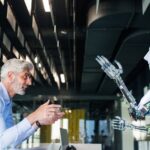 Meta is shaking up the world of robotics with its latest creation, the V-JEPA 2—a robust world model powered by 1.2 billion parameters and trained primarily on raw video. Built on the Joint Embedding Predictive Architecture (JEPA), this model is designed to boost a robot’s ability to understand, predict, and plan, letting it get comfortable in fresh environments without needing loads of specific training. The process kicks off with a self-supervised phase that teaches the model by digesting over a million hours of video alongside an equal number of images, letting it pick up on patterns in how the physical world works. Next, it moves into action-conditioned learning, where about 62 hours of robot control data help tie the model’s predictions to real actions.
Meta is shaking up the world of robotics with its latest creation, the V-JEPA 2—a robust world model powered by 1.2 billion parameters and trained primarily on raw video. Built on the Joint Embedding Predictive Architecture (JEPA), this model is designed to boost a robot’s ability to understand, predict, and plan, letting it get comfortable in fresh environments without needing loads of specific training. The process kicks off with a self-supervised phase that teaches the model by digesting over a million hours of video alongside an equal number of images, letting it pick up on patterns in how the physical world works. Next, it moves into action-conditioned learning, where about 62 hours of robot control data help tie the model’s predictions to real actions.
In hands-on lab tests, V-JEPA 2 has already shown promising skills in tasks like pick-and-place operations, using vision as a guide and setting visual subgoals to master more involved challenges like precise object placement. Early trials suggest the model can adapt to new objects and settings, consistently hitting success rates between 65% and 80% even in unfamiliar territory. Yann LeCun, Meta’s chief AI scientist, puts it simply: world models like V-JEPA 2 might soon empower AI agents to tackle everyday physical chores without needing enormous amounts of training data.
There’s still work to be done, especially when it comes to matching human-level performance across different timescales and sensory inputs like audio or touch. To help push this further, Meta has rolled out three new benchmarks—IntPhys 2, MVPBench, and CausalVQA. These tests are designed to check the model’s grasp of physical plausibility, its understanding in video-based Q&A, and its ability to reason about cause and effect.
Meta is opening up access to V-JEPA 2’s code and model checkpoints for both commercial and research projects, inviting the tech community to delve deeper into the potential of world models in robotics and embodied AI. If you’ve ever been frustrated by the time and data needed to get your robots to perform reliably, this development could be a refreshing change. Meanwhile, other tech giants like Google DeepMind and startups like World Labs are busy refining their own approaches, setting the stage for a new era in intelligent robotics.








